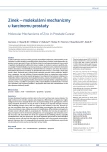Psychological Support for Cancer Care Professionals: Contemporary Theory and Practice within the Czech Healthcare System
Authors:
M. Světlák 1; A. Suchý 2
Authors‘ workplace:
Dětská nemocnice, FN Brno
1; Ordinace klinické psychologie, Prostějov
2
Published in:
Klin Onkol 2011; 24(4): 302-307
Category:
Short Communication
Overview
Health care professionals, especially those working in cancer care, represent a subgroup of helping professions that requires special psychological care. Recent findings clearly show that a lack of regular psychological care for oncologists and oncology nurses leads to higher rate of psychiatric and physical illness, poorer quality of life, higher employee fluctuation rates and lower quality of provided medical care. In spite of this, the special psychological care for cancer care professionals is still lacking and theoretical and practical level of their undergraduate and postgraduate education in psychology does not satisfy the demands of clinical practice. Regular group meetings seem to be an effective way of psychological care. They provide an opportunity for the participants to view own problems from a distance and to seek new options. It allows them to gain new insights from the discussed situations and to get support or feedback from colleagues. Regular group meetings also represent a key component of self-care and it is an important preventive factor of exhaustion that has been shown to cause medical or personal misconducts. In this context, the aim of the present paper is to describe the basic theoretical background for regular group meetings of oncologists and oncology nurses and to refer about the current practice within the Czech health care system.
Key words:
clinical supervision – group psychotherapy – prevention – prophylaxis – Gestalt approach
Sources
1. Firth-Cozens J. Interventions to improve physicians’ well-being and patient care. Soc Sci Med 2001; 52(2): 215–222.
2. Linzer M, Konrad TR, Douglas J et al. Managed care, time pressure, and physician job satisfaction: results from the physician worklife study. J Gen Intern Med 2000; 15(7): 441–450.
3. Taub S, Morin K, Goldrich MS et al. Council on Ethical and Judicial Affairs of the American Medical Association. Physician health and wellness. Occup Med 2006; 56(2): 77–82.
4. Schattner P, Davidson S, Serry N. Doctors’ health and wellbeing: taking up the challenge in Australia. Med J Aust 2004; 181(7): 348–349.
5. Severová J. Zátěž pečovatelských týmů u těžce a chronicky nemocných pacientů. In Gerontologické dny. Ostrava: Barrister 1999.
6. Hawkins P, Shohet R. Supervize v pomáhajících profesích. Praha: Grada 2004.
7. Tyssen R. Health problems and the use of health services among physicians: a review article with particular emphasis on Norwegian studies. Ind Health 2007; 45(5): 599–610.
8. Sivertz K. When physicians need admission to a psychiatric unit. B C Med J 1998; 40 : 156–158.
9. Rosvold EO, Bjertness E. Illness behaviour among Norwegian physicians. Scand J Public Health 2002; 30(2): 125–132.
10. Kivimäki M, Sutinen R, Elovainio M et al. Sickness absence in hospital physicians: 2 year follow up study on determinants. Occup Environ Med 2001; 58(6): 361–366.
11. Meulmeester F. Změna přijde, když se zastavíš. Praha: Drvoštěp 2010.
12. Kelly B, Long A, McKenna H. Clinical supervision Personal and professional development or the nursing novelty of the 1990s? In: Cutcliffe JR, Butterworth T, Prostor B (eds). Fundamental Themes in Clinical Supervision. London, New York: Taylor & Francis 2001.
13. Brooker C, White E. The Fourth Quinquennial National Community Mental Health Nursing Census of Northern Ireland. Sheffield: University of Sheffield and Keele University 1997.
14. Světlák M, Suchý A, Vyzula R. První zkušenosti s profylaktickým a terapeuticko poradenským programem pro lékaře a sestry na MOÚ: využití Gestalt přístupu ve zdravotnictví. In: Edukační sborník XXXIV. brněnské onkologické dny s XXIV. konferencí pro sestry a laboranty. Brno: Masarykův onkologický ústav 2010 : 193.
15. Mackewn J. Gestalt psychoterapie. Praha: Portál 2004.
Labels
Paediatric clinical oncology Surgery Clinical oncologyArticle was published in
Clinical Oncology

2011 Issue 4
- Possibilities of Using Metamizole in the Treatment of Acute Primary Headaches
- Metamizole at a Glance and in Practice – Effective Non-Opioid Analgesic for All Ages
- Metamizole vs. Tramadol in Postoperative Analgesia
- Spasmolytic Effect of Metamizole
- Metamizole in perioperative treatment in children under 14 years – results of a questionnaire survey from practice
-
All articles in this issue
- Molecular Mechanisms of Zinc in Prostate Cancer
- Advances in Clinical Treatment of Malignant Melanoma: B-RAF Kinase Inhibition
- Palliative Cancer Care within the Hradec Králové Region Health Care System: Own Experience
- Schnitzler Syndrome: Diagnostics and Treatment
- Oropharyngeal Mucositis – Pain Management
- Detection of Circulating Tumor Cells from Peripheral Blood in Patients with Transitional Cell Carcinoma – Pilot Study. Comparison with the Standard Histopathological Staging
- Pulmonary Metastases of the Clear Cell (Conventional) Renal Cell Carcinoma – Options and Results of Surgical Treatment
- The Role of Procalcitonin in the Differencial Diagnosis of Fever in Patiens with Multiple Myeloma
- Psychological Support for Cancer Care Professionals: Contemporary Theory and Practice within the Czech Healthcare System
- The Year 2011 is the Year of Melanoma: Melanoma Forum, Frankfurt, 19 May 2011
- Low Molecular Weight Heparins for Thromboprophylaxis during Induction Chemotherapy in Patients with Multiple Myeloma
- Clinical Oncology
- Journal archive
- Current issue
- About the journal
Most read in this issue
- Oropharyngeal Mucositis – Pain Management
- Schnitzler Syndrome: Diagnostics and Treatment
- Molecular Mechanisms of Zinc in Prostate Cancer
- The Role of Procalcitonin in the Differencial Diagnosis of Fever in Patiens with Multiple Myeloma
